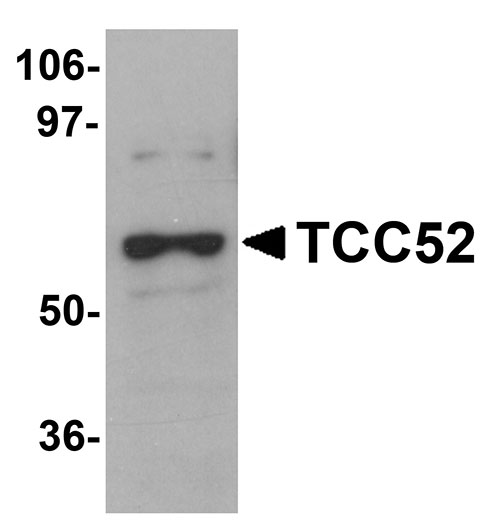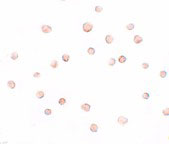TCC52 Antibody
- 产品详情
- 实验流程
- 背景知识
Application
| WB, ICC, E |
|---|---|
| Primary Accession | Q5T6F0 |
| Other Accession | NP_056212, 22218619 |
| Reactivity | Human, Mouse, Rat |
| Host | Chicken |
| Clonality | Polyclonal |
| Isotype | IgY |
| Calculated MW | 50517 Da |
| Concentration (mg/ml) | 1 mg/mL |
| Conjugate | Unconjugated |
| Application Notes | TCC52 antibody can be used for detection of TCC52 by Western blot at 1 µg/mL. Antibody can also be used for immunocytochemistry starting at 2.5 µg/mL. |
| Gene ID | 25853 |
|---|---|
| Other Names | DDB1- and CUL4-associated factor 12, Centrosome-related protein TCC52, Testis cancer centrosome-related protein, WD repeat-containing protein 40A, DCAF12, KIAA1892, TCC52, WDR40A |
| Target/Specificity | DCAF12; |
| Reconstitution & Storage | TCC52 antibody can be stored at 4℃ for three months and -20℃, stable for up to one year. As with all antibodies care should be taken to avoid repeated freeze thaw cycles. Antibodies should not be exposed to prolonged high temperatures. |
| Precautions | TCC52 Antibody is for research use only and not for use in diagnostic or therapeutic procedures. |
| Name | DCAF12 {ECO:0000303|PubMed:16949367, ECO:0000312|HGNC:HGNC:19911} |
|---|---|
| Function | Substrate-recognition component of a DCX (DDB1-CUL4-X-box) E3 ubiquitin-protein ligase complex of the DesCEND (destruction via C-end degrons) pathway, which recognizes a C-degron located at the extreme C terminus of target proteins, leading to their ubiquitination and degradation (PubMed:16949367, PubMed:16964240, PubMed:29779948). The C- degron recognized by the DesCEND pathway is usually a motif of less than ten residues and can be present in full-length proteins, truncated proteins or proteolytically cleaved forms (PubMed:29779948). The DCX(DCAF12) complex specifically recognizes proteins with a diglutamate (Glu-Glu) at the C-terminus, such as MAGEA3, MAGEA6 and CCT5, leading to their ubiquitination and degradation (PubMed:29779948, PubMed:31267705). Ubiquitination of MAGEA3, MAGEA6 by DCX(DCAF12) complex is required for starvation-induced autophagy (PubMed:31267705). Also directly recognizes the C-terminal glutamate-leucine (Glu-Leu) degron as an alternative degron in proteins such as MOV10, leading to their ubiquitination and degradation. Controls the protein level of MOV10 during spermatogenesis and in T cells, especially after their activation (PubMed:34065512). |
| Cellular Location | Cytoplasm. Cytoplasm, cytoskeleton, microtubule organizing center, centrosome. Nucleus |
| Tissue Location | Highly expressed in lung cancer tissues and some cancer cell lines (PubMed:18957058). Restricted expression in normal testis (PubMed:18957058). |
For Research Use Only. Not For Use In Diagnostic Procedures.
Provided below are standard protocols that you may find useful for product applications.
BACKGROUND
TCC52 Antibody: Cancer-testis (CT) antigens are a type of antigen whose expression is highly restricted, primarily in normal testis, but aberrantly in different tumor types. Their immunogenicity in cancer patients makes them prime targets for immunotherapy of human tumors. One such CT antigen is TCC52, a novel centrosomal protein. TCC52 is a WD repeat-containing protein that interacts with the COP9 signalosome, a macromolecular complex that interacts with cullin-RING E3 ligases and regulates their activity by hydrolyzing cullin-Nedd8 conjugates. The normal biological function of this protein is not known at this time.
REFERENCES
Scanlan M, Simpson A, and Old L. The cancer/testis genes: review, standardization, and commentary. Cancer Immun.2004; 4:1-15.
Xia L, Li Y, Yang D, et al. Identification of new centrosome proteins by autoimmune patient sera. Sci. China C. Life Sci.2007; 50:194-202.
Li S, Hu X, Cui S, et al. Novel centrosome protein, TCC52, is a cancer-testis antigen. Cancer Sci.2008; 11:2274-9.
终于等到您。ABCEPTA(百远生物)抗体产品。
点击下方“我要评价 ”按钮提交您的反馈信息,您的反馈和评价是我们最宝贵的财富之一,
我们将在1-3个工作日内处理您的反馈信息。
如有疑问,联系:0512-88856768 tech-china@abcepta.com.























 癌症的基本特征包括细胞增殖、血管生成、迁移、凋亡逃避机制和细胞永生等。找到癌症发生过程中这些通路的关键标记物和对应的抗体用于检测至关重要。
癌症的基本特征包括细胞增殖、血管生成、迁移、凋亡逃避机制和细胞永生等。找到癌症发生过程中这些通路的关键标记物和对应的抗体用于检测至关重要。 为您推荐一个泛素化位点预测神器——泛素化分析工具,可以为您的蛋白的泛素化位点作出预测和评分。
为您推荐一个泛素化位点预测神器——泛素化分析工具,可以为您的蛋白的泛素化位点作出预测和评分。 细胞自噬受体图形绘图工具为你的蛋白的细胞受体结合位点作出预测和评分,识别结合到自噬通路中的蛋白是非常重要的,便于让我们理解自噬在正常生理、病理过程中的作用,如发育、细胞分化、神经退化性疾病、压力条件下、感染和癌症。
细胞自噬受体图形绘图工具为你的蛋白的细胞受体结合位点作出预测和评分,识别结合到自噬通路中的蛋白是非常重要的,便于让我们理解自噬在正常生理、病理过程中的作用,如发育、细胞分化、神经退化性疾病、压力条件下、感染和癌症。







